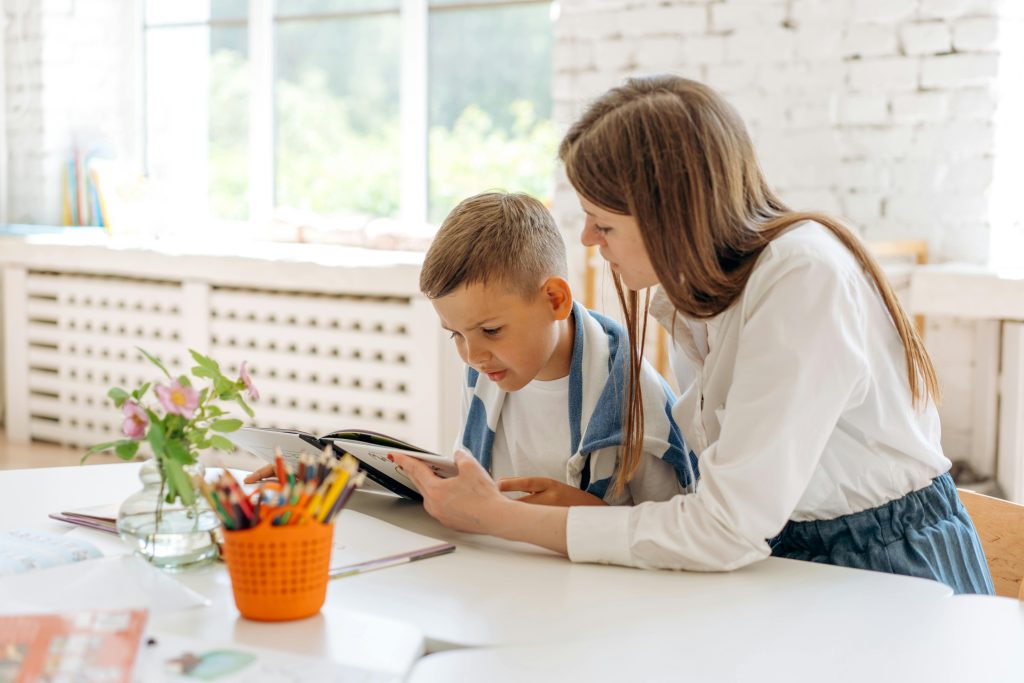Ava is 8 years old. She is a sincere child and diligently completes her homework when asked to. When her parent asks her to switch off the television, she understands her screen-time limits and agrees to do so.
While growing up, she has always been labelled as obedient, honest, and hardworking. Wait. There’s a catch here. She’s obedient, but not one of the productive children. Ava agrees but does not lead. In short, she is reactive and not proactive. Her parents were concerned about this.
However, their friends brush this off, saying, “Every parent wishes for a child like her”. Do you think that Ava’s parents are being unreasonable? Are you of the opinion that a handful of good traits is enough? Do you want your child to have specific attributes more than the other?
If I were Ava’s mom, I would certainly want her to be productive. While hard work is good, I would wish that she were a smart worker. I would always appreciate that she is sincere, yet I would want her to be outspoken. My wish would be that she thinks for herself and does not agree to everything that I ask her to do. I would want her to be an adult who shines through in good times and bad.
How can I do this?
Ava is just 8. Isn’t it too early to make her proactive?
When will she enjoy her childhood if she’s taught all this now?
Do you know that successful adults are those who developed positive attributes as children? When children, as young as 2, utilise their inherent abilities, they develop skills that benefit them as adults.
How does productivity benefit children?
Self-reliance
Productive children are independent. They balance studies with their hobbies, chores, and other activities.
Self-Esteem
If you want to help your child become confident and outspoken, start by making her productive.
Resilience
Children should learn to plan and organise their day. This helps build a growth-mindset. Such children overcome challenges easily.
Time Management
Productive children achieve more in less time by prioritising tasks and meeting deadlines.
Problem Solving
Children who plan their days effectively learn to solve problems creatively and quickly.
Self-motivation
Children who make productivity a habit reach their goals faster. They are self-motivated and more satisfied compared to other children.
Responsibility
With productivity, children also learn the importance of responsibility. They take on tasks without being asked. Such children contribute positively to family and teams.

How to imbibe productivity in children?
Establish a Routine
Children thrive in routine. When children have a consistent routine, they can achieve more. Instead of imposing a routine or schedule on your child, sit and design one together. This helps them become more responsible.
Set aside time for meals, homework, extra study, creativity, household chores, and of course, play. A routine helps children feel more secure. When they understand what is expected of them, they become self-motivated.
Create a Dedicated Work Area
When I was young, my mom once told me not to eat at the place where I studied. The place where we study should be devoid of distractions. If your child uses the study table for meals, homework, and also for playing, then he does not associate the table with studies.
Similarly, if you use your bed for meals, movies, and card games, you are not able to associate it with sleep. Hence, many people face sleeplessness for this reason. When a child uses the study table solely for homework, he completes the homework faster without any distractions.
Embrace Healthy Habits
A healthy child has an active mind. Children who eat nutritious food and get enough exercise tend to be more productive than their counterparts. With good food comes consistent energy levels in children.
They can focus on the work and finish tasks faster. Instead of reprimanding children for consuming junk food, you can make them self-responsible. They should know that they cannot have refined flour or chocolates daily. When children know their limits, they do not test them (frequently).
Build a Growth Mindset
Children get demotivated quickly. Just like adults, they can leave an activity for good if they are not successful at the first trial. Parents can curb this habit and focus instead on building a growth mindset.
Such children try to overcome challenges on their own. When they face a curveball, they can manage the crisis and move on quickly. When children bounce back without much effort, they become more successful later in life.
How to teach children to manage tasks?
Use Planners
While elders might think school homework is more important than a playdate, children do not. For children, their toys, friends, and screens are always a priority. Here comes the role of planners.
Help your child create a planner with to-do lists. This can be done daily or weekly basis. Planners help children prioritise tasks, track progress, and help take breaks. This even helps reduce clashes of thoughts or differences of opinions, especially with 8+ year olds.
Break down tasks
Complete the homework is a vague phrase. Children need instructions that they can follow. Help them break down tasks. For instance, complete English workbook page no. 12 on your own and your father will help you complete page no. 13.
When children are guided to break larger tasks into smaller bite-sized ones, they can easily manage them. In addition, the work feels less overwhelming to children and more achievable.
Set Realistic Goals
If you ask your child to learn the times tables 2 to 12 in a single day, he might not be able to learn even one of them within the set time. Instead, set realistic goals – something that they can achieve. Your child might beat the goal and have spare time. Let him enjoy this time playing his favourite game, rather than doing bonus homework.
Include Breaks
All work and no play makes Jill a dull girl. The productivity of children starts decreasing if they do not get breaks. Always include short breaks between tasks. Allow them to breathe and soak in the pleasure of achieving a milestone. They are very happy when they are successful, just like you and I are.
What habits make children productive?
Distraction-free Environment
Children should be taught not to get distracted while working. This will help them complete the task faster and without any errors. Parents can use timers to help them focus on the work.
Monotasking
Gone are the days of multi-tasking. Monotasking is back in the business. When children focus on one task at a time, they are found to be more productive and focused.
Patience
Ask children to be patient with themselves. Often, children judge their tasks through your lens. They want to emulate the skills of their elders. To make things easier, you can quote your experiences with the task when you did it for the first time. This has always helped me with my daughter.
Consistency
Children have a habit of doing a chore once and never repeating it if they fail. Instead, train children to be consistent with the tasks. Make them understand that the key to mastering any skill is consistency and hard work.
How can parents make children productive?
Quality Time
Parents who spend focused, uninterrupted and quality time have more productive children. Parent-child bonding results in good mental health. Children are better behaved and learn co-operation and harmony.
Responsibilities
When children are given responsibilities, they feel more confident and trusted. Parents should therefore assign age-appropriate chores that help develop skills and responsibility in children.
Independence
When children are made accountable for their homework, toys, and household chores, there are more chances of them getting the work done. It helps them later in life by encouraging self-motivation, productivity, and personal growth.

Parent-Tested: 5 Productivity Hacks That Worked for My Daughter
Hack #1
Tackle Procrastination
My daughter tends to play first and delay her homework. Whenever she asks me whether she can play for some time before jumping to homework, I tell her one simple rule. All those tasks that you find difficult need to be addressed first. This way you are relaxed and enjoy your favourite ones. As a result, Math homework was finished quickly to spend more time on creative projects.
Hack #2
Earn Screen-Time
My daughter is free to watch television. But she needs to earn her TV time. Even she felt good while watching her favourite shows when all her chores were completed. Earlier, the first thing she wanted to do, after returning from school, was to watch television.
She always wanted to watch ‘5 more minutes’, and this delayed all other chores on her list. This often resulted in a scuffle between us. Hence, I asked her to complete her chores and then watch television for a stress-free time (this is valid for both of us).
Hack #3
Give 100% Focus
My daughter is a storyteller. Every incident in the school is narrated animatedly, and often, between homework assignments. She even has a habit of thinking about what game she will play later or which kind of card she is going to prepare for her teacher.
This and similar other stuff can be discussed post homework. These things, obviously, delay the homework. Hence, she decided to set an online timer and stick to it. This helped her give her one hundred per cent focus to studies.
Hack #4
Avoid Group Study
When I was in school, my parents didn’t allow me to join group studies. They did not have an explanation for the same. However, now, when I have a daughter, I completely understand why they did not.
Group studies are more fun and less focused. Instead of blankly saying no, I allow my daughter to join her friends for group studies, but the objective is fun. She is asked to do actual studies first before joining her friends.
Hack #5
Limit Extra-curricular
I did not put too much on my daughter’s plate. After-school activities often burden students. They do not leave much time and space for free play. When children are involved in guided activities throughout the day, their thinking skills are curbed. T
hey are not able to make decisions or tackle a crisis on their own. Children love the extracurricular activities for a week or two, but gradually they lose interest. Instead, opt for 1-2 post-school activities for your children. This way, they have enough time for homework and free play.
In the end
While productivity hacks for children can help build good habits, it’s important to remember that no single approach fits all. Every child is different, with unique interests, learning styles, and energy levels. What works wonders for one may not suit another.
More importantly, productivity is not the ultimate goal at a young age. Childhood should be about curiosity, play, and joy. Rather than pushing children to achieve quickly, give them the space to grow at their own pace.
With patience and gentle guidance, children will naturally develop the skills they need when the time is right. Just like you and I did. We are doing just fine, aren’t we?!








Leave a Reply